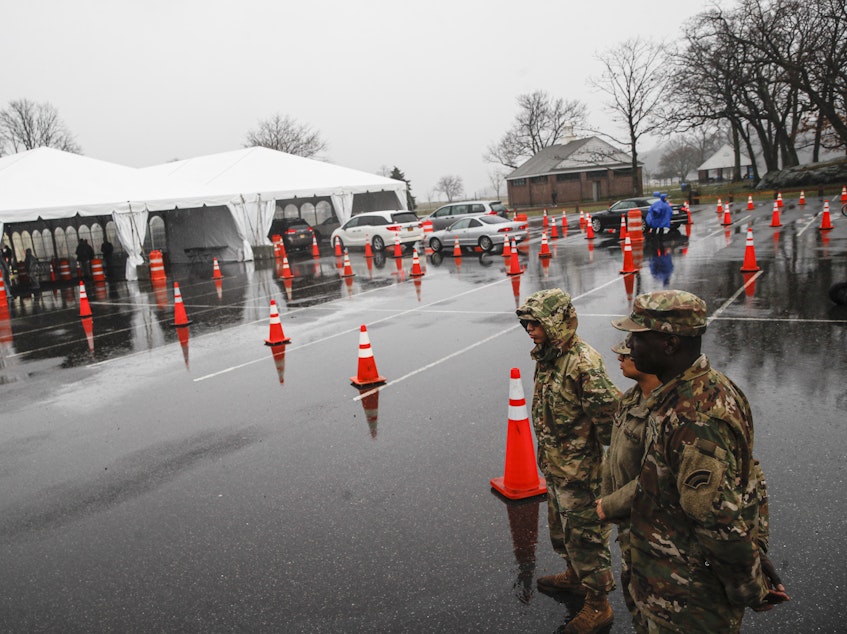The Struggle To Keep Vulnerable Seniors Safe In A Large Coronavirus Cluster

On a spring morning, Jamie Fields and her mom Joyce Collins are standing outside a grocery store in New Rochelle, N.Y., arguing over how to stay safe.
"She's very nervous," Collins says. She's only 57, but was recently diagnosed with lung cancer, which means she's vulnerable to COVID-19. "I just got out of the hospital."
They live together just up the street in the center of the New Rochelle containment area. They say they're trying to keep their sense of humor about a global pandemic that's landed on their doorstep.
"If we're going to die together, we're going to die together," Fields says.
But nervous jokes aside, she says she's not sure what to do to protect her mom from the new coronavirus, while also going to work every day in New York City and taking care of her own kids.
Sponsored
"This epidemic is very scary. You know just because it's just transferring so fast," Fields said. "You got to ride the subways and then everyone's just clustered on you. I'm nervous."
The National Guard is here helping people manage the disruption, distributing food and helping sanitize public areas. On Friday, a new COVID-19 testing facility was established in the suburban community just north of New York City.
For now, the rules for the one-mile radius containment area still allow people to move around and go to work, though federal guidelines urge people in hotspot areas like this to work from home as much as possible.
Fears focus on seniors, nursing homes
As COVID-19 cases in New Rochelle continue to rise, Gov. Andrew Cuomo says he worries most about people like Joyce Collins.
Sponsored
"That is the most dangerous situation posed by this virus, senior citizens, people with a compromised immune system," he said this week.
Many of the deaths in the U.S. are tied to a single senior care facility in Washington state. Cuomo says he hopes to avoid that kind of crisis, so nursing homes across New York state have been ordered to halt all visitation. That means no unauthorized people in or out.
"Right now what my job is to keep residents we care for safe, to keep them happy," said Rita Mabli who runs United Hebrew of New Rochelle. It's a nursing home and assisted living community with roughly 500 residents in the containment area.
All those people now live under strict lockdown. The staff, too, face new hygiene rules designed to keep coronavirus at bay.
"We screen every single staff that's coming into the facility," says Jerome Bagaporo, a nurse who runs United Hebrew's clinical program. "We ask them...do you have any symptoms? Do you have cough, do you have cold?"
Sponsored
As the days pass, Rita Mabli says tensions have risen. Families, some of them living outside the New Rochelle area, are scared and frustrated by the quarantine.
"There are people who are angry no matter what you do," Mabli says. "We've set up Skype and Facebook access so that people who want to visit face-to-face, virtually face-to-face, with their families can use the Skype."
New Rochelle Mayor Noam Abramson is one of the people directly affected by the nursing home lockdown.
"My mother is at United Hebrew presently and my brothers and I are not able to visit her," he said.
"It's distressing for family members not to be able to visit each other, there's a real cost that comes along with a policy like this. But I think this is a sensible policy and my perception is that most people agree."
Sponsored
The nursing home quarantine isn't t protecting all seniors in New Rochelle. Many older New Yorkers live independently. Ed Grayson is 75 and has an apartment in the containment area. With no family nearby, he went out to buy a few essentials.
"What can really be done except be cautious, wash your hands and hope for the best?" he asked.
The containment area and its restrictions are set to remain in place through at least March 25. But speaking in New Rochelle on Friday, Gov. Cuomo predicted the coronavirus disruption could last months. [Copyright 2020 NPR]

